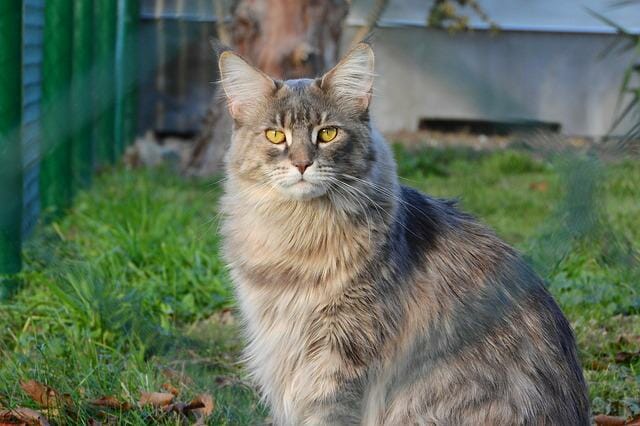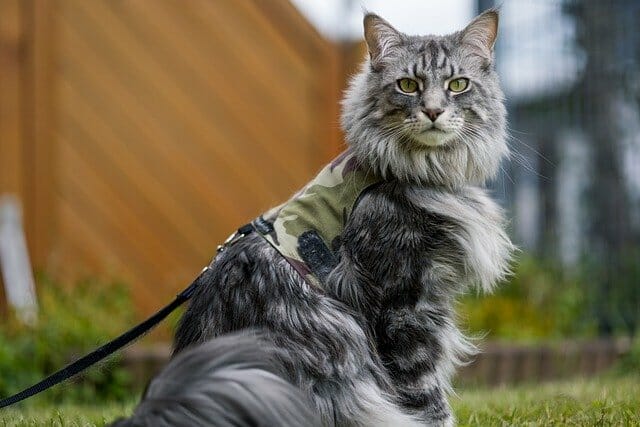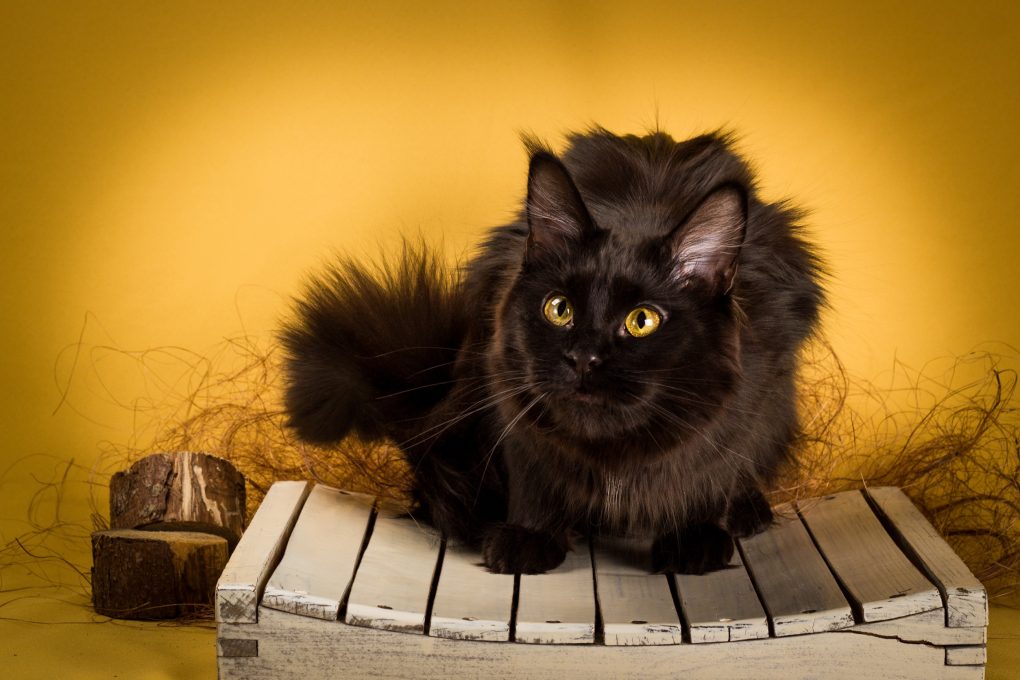How Big Do Maine Coon Cats Get: All About the Growth of a Maine Coon Cat
Maine Coon cats are known for their large size, and they can grow to be quite big. On average, adult Maine Coon cats weigh 10-25 pounds (4.5-11.3 kg), with males typically larger than females. However, some Maine Coon cats can grow even larger than this; the title for the biggest Maine Coon cat goes to a feline named Stewie, measuring a staggering 48.5 inches (123 cm) from nose to tail. It is worth noting that not all Maine Coon cats will reach their maximum size, and the size of a Maine Coon can vary depending on genetics, diet, and lifestyle.
Table of Contents
Growth Stages of Maine Coon Cats


Newborn
Maine Coon kittens are born small and helpless, like all newborn kittens. Critter Facts says they are typically born in litters of 3-4 kittens, while the Maine Coon kittens are born with their eyes and ears closed, and they rely entirely on their mother for nourishment and care.
During the first few weeks of life, Maine Coon kittens will spend most of their time sleeping and nursing. They will start growing quickly during this time and gain weight rapidly. Maine Coon kittens are born with a soft and fuzzy coat, and their coat color and pattern may become more apparent as they grow.
It is important to provide newborn Maine Coon kittens with a warm and safe environment and ensure they get enough milk from their mother. Handling newborn kittens gently and carefully is also important, as they are delicate and can be easily injured. Regular veterinary checkups are also important during this stage to ensure that the kittens are healthy and developing properly.
Two to Three Weeks
At two to three weeks old, Maine Coon kittens are becoming more aware of their surroundings. They will open their eyes, and their ears will begin to function. They will also begin to move around more and explore their environment.
During this stage, Maine Coon kittens still completely depend on their mother for food and care. They will spend most of their time nursing and sleeping but also start playing and interacting with their littermates.
Providing the kittens with a warm and safe environment is important, as they are still very vulnerable at this age. The mother cat will be very protective of her kittens, but it is important to supervise them closely and handle them gently to avoid injury.
Four to Six Weeks
At four to six weeks old, Maine Coon kittens are becoming more active and playful. They will start interacting with their littermates and may even start to play, fight, and wrestle with each other. They will also explore their environment more and may begin to climb and jump.
Maine Coon kittens will be fully weaned by this stage and will be starting to eat solid food. They may still nurse occasionally, but their mother will start to wean them off milk. This is a good time to start introducing them to different types of food and ensuring they have a balanced and nutritious diet.
Maine Coon kittens will also be developing their social skills at this stage. They will learn how to communicate with each other and humans and start to exhibit personality traits that will continue into adulthood. It is important to handle the kittens gently and frequently at this stage to help them become comfortable around humans.
Seven to Twelve Weeks


At seven to twelve weeks old, Maine Coon kittens are becoming more independent and self-sufficient. They will be fully weaned, eating solid food, and starting to use the litter box consistently.
Maine Coon kittens will be active and playful at this stage and need plenty of toys and activities to keep them stimulated. They may start to exhibit hunting behaviors, such as pouncing and stalking, and will enjoy playing with toys that allow them to practice these skills.
Maine Coon kittens will also be developing their social skills and will benefit from continued socialization with humans and other cats. In addition, they will be more comfortable around humans at this stage and enjoy interacting with their human family members.
Regular veterinary checkups and vaccinations are still important at this stage, and the kittens should be spayed or neutered at around 6-8 months of age. This is also a good time to start training the kittens and teaching them basic commands, such as “come” and “stay”. Positive reinforcement techniques work well with Maine Coon kittens, who are eager to please their humans.
Four to Six Months
At four to six months old, Maine Coon kittens continue to grow and develop and will be more independent and self-sufficient but enjoy playing and interacting with their humans and other cats.
Maine Coon kittens may start to exhibit more territorial behaviors at this stage, such as marking their territory with urine or scratching. Therefore, it is important to provide them with appropriate scratching posts and litter boxes and train them to use them consistently.
Maine Coon kittens will also be developing their adult coat at this stage, which may start to become thicker and more luxurious. They may need more grooming and brushing to keep their coat healthy and free of tangles.
Factors Affecting the Growth of Maine Coon Cats
Genetics
Genetics play a significant role in determining the size, appearance, and temperament of Maine Coon cats. Maine Coons are a breed of cat believed to have evolved naturally in North America, and their environment and natural selection have shaped their genetics over many generations.
The genetics of Maine Coon cats are complex, and there is still much that is not fully understood about the inheritance of specific traits. However, it is known that genes that control traits such as size, coat color and pattern, and personality are passed down from parents to offspring.
Breeding programs can also influence the genetics of Maine Coon cats. Breeders may select specific traits, such as large size or certain coat color, to create cats that conform to certain breed standards. However, it’s important for breeders to prioritize the health and well-being of the cats they breed and to avoid breeding for extreme traits that can lead to health problems.
Nutrition


Proper nutrition is essential for the healthy growth and development of Maine Coon cats. As a large breed, Maine Coons require a diet that is balanced and provides them with the appropriate levels of protein, fat, and nutrients.
A portion of high-quality commercial cat food formulated for Maine Coon cats can provide all the necessary nutrients for a healthy diet. Therefore, choosing cat food made with high-quality ingredients, such as meat or fish, as the primary protein source is important. It does not contain fillers or artificial preservatives.
In addition to providing a balanced diet, it’s also important to ensure that Maine Coon cats have access to clean water at all times. A cat’s hydration needs will depend on several factors, including age, weight, and activity level. For example, Maine Coon cats are known to be big drinkers and may require more water than other cat breeds.
Exercise
Maine Coon cats are known for being active and playful, requiring regular exercise to maintain their health and well-being. As a large and energetic breed, Maine Coons need plenty of space to move around and play.
Providing your Maine Coon cat with toys and climbing structures can help to keep them active and engaged. Toys encouraging play and exercise, such as laser pointers or interactive puzzle toys, can be especially beneficial.
Regular playtime and exercise can help to prevent obesity, which is a common health concern for Maine Coon cats. Obesity can lead to various health problems, including joint issues and diabetes.
